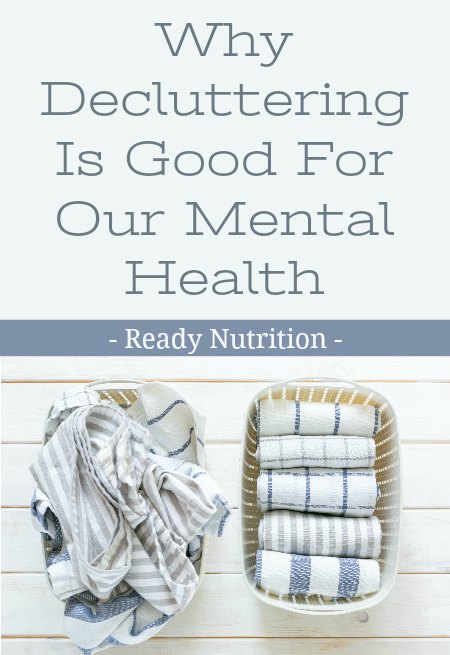As Americans, we have a lot of clutter. I know I used to! But decluttering has many benefits, including those that positively impact our mental health.
As a society, we are busier and more stressed-out than ever. This makes it easy to see why the Kon Mari method of decluttering and minimalism trends are so popular right now. And to be fair, they aren’t popular with everyone. Some people just always have a lot of stuff and will always have a lot of stuff. Have you ever been in a house that is so filled with stuff it makes you anxious? I have. And that feeling prompted me to get rid of more than two truckloads of stuff in 2019, and change my habits for good!
But by making changes to eliminate unnecessary clutter, it made me feel lighter. Not like I weighed less, but I was less stressed out. And there’s scientific evidence to show that clutter can cause stress while those who declutter get an improvement in their mental health.
Is Minimalism the True Secret to Happiness?
In an article by Right As Rain, Brenna Renn, Ph.D., a licensed clinical psychologist and acting assistant professor in the Department of Psychiatry and Behavioral Sciences at the University of Washington discussed the phenomenal effect decluttering has on our mental well-being. “I do think that we are hardwired as humans to look for patterns in our environment and to find comfort in predictable patterns and occurrences,” Renn says. “That may be the underpinning of where this interest in decluttering is coming from. If we can make our home environments these predictable environments, it might support our mental health.”
Ready Nutrition touched on this very subject previously too:
Your Environment is Key To Your Happiness: Finding the Balance You Need to Simplify Your Home
Environmental wellness is living a lifestyle that is respectful of our surroundings and reflects our desired mental state. It encourages us to live in harmony with the Earth by taking action to protect it and promotes interaction with nature and your personal environment. This can all be started by adopting a more minimalist lifestyle. But don’t worry if you can’t live with only 30 or 45 items, start slow, and you’ll be surprised what you can live without.
Living with less does two very powerful things for us as human beings. It reduces our consumerism and therefore reduces our waste and the destruction we do to the Earth and it saves us money. It also helps us get control of our personal environment and live more simply and intentionally.
And all of that has net positive benefits for our mental health. Because clutter can be distracting, as Renn explains, clearing it out may help us focus better. Take, for example, a messy cubicle or a home office that’s 10 feet from a pile of dishes and laundry that needs folding and it’s no wonder you’re having trouble getting anything done. “I think about clutter as visual static,” says Renn. “When you’re in between radio stations, the static can be very distracting.” That’s why once it’s removed, a sense of focus returns to what used to be chaotic static.
The clutter can be distracting too, and clearing it can help you unwind and de-stress. “If it’s the case where you want to lie down and read or watch a movie or listen to music but your living room is cluttered, it’s going to be hard to immerse yourself in that activity. You’ll be pulled to that stack of clutter or the boxes you haven’t unpacked,” says Renn.
People who have a lot of stress or anxiety issues could also benefit from a more tidy home with free space. “People with anxiety are already hypervigilant to any sort of stress response. Their stress alarm is already dialed up. Anything like clutter or anything disruptive in their environment could be one more thing that tips the scales for them,” she says. Renn added that decluttering is not a cure for anxiety disorders, but is simply one action, in addition to seeking medical care, that may help ease troublesome symptoms.
It’s also important to remember that clutter is subjective. For some, a stack of mail on the counter doesn’t really count as a mess, whereas others can feel stressed out when a single item on the bookshelf is out of place. Keep YOUR personal ideas of clutter and what it is to you in mind when you begin the process of simplifying your life. Don’t try to make your home look exactly like the one you see on Pinterest. Try to make it neat and tidy to YOUR standards, not someone else’s. The goal here is to improve your environment, not get stressed out because you can’t meet the standards of a staged home.
If you’de like to try decluttering, you should start small. Don’t just throw everything out. Go room by room, and spend a whole day thinking about if you should or want to keep certain things. This is all about peace of mind, and if getting rid of some your stuff stresses you out, don’t try it! Do what’s right for you. Let’s face it: decluttering isn’t for everyone. We are all different and one-size-fits-all trends don’t cut it for all people.

